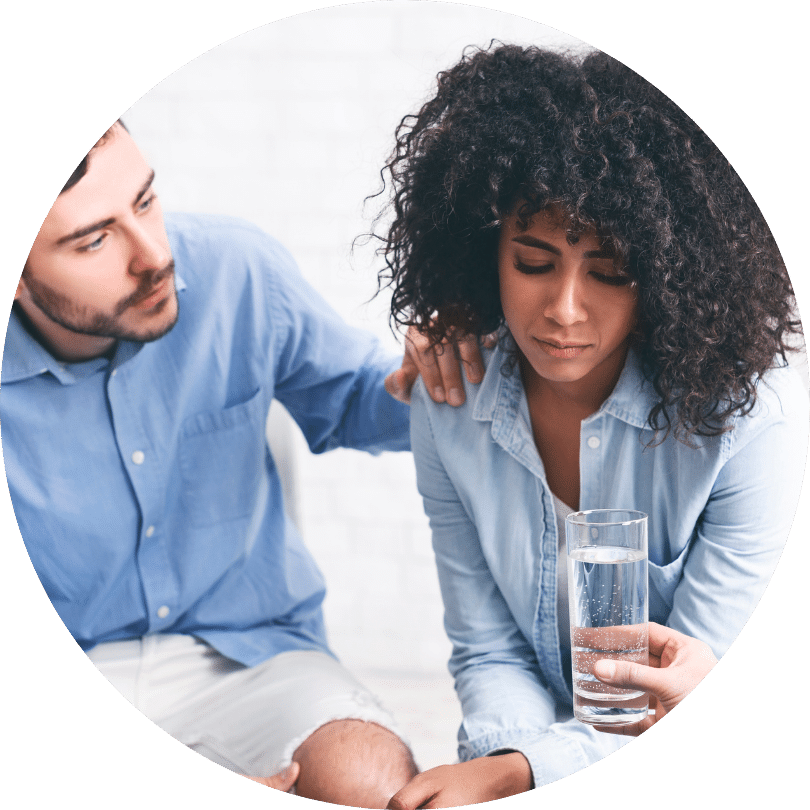Alcohol is a substance that has a long and complex history of being used as both an intoxicant and a medicine. What’s the answer to the question, “Is alcohol a stimulant or depressant?” Alcohol is a depressant despite having what seems like stimulating effects for some people. Many people may think it’s a stimulant because of the stimulant effects of alcohol. Your first drink may make you feel less inhibited, more talkative, and livelier. However, alcohol slows down your central nervous system (CNS) and can be dangerous and deadly when abused.
Is Alcohol a Stimulant or Depressant?
Alcohol is a depressant. It slows down the messages traveling between the brain and the body. It affects the central nervous system and can cause you to feel more relaxed but also less in control of your behaviors and emotions. Alcohol consumption impacts the body in various ways. It initially acts like a stimulant, sometimes increasing energy levels and making you more social and talkative. As its effects set in further, it becomes a depressant.
Alcohol effects include:
- Slowing down reaction times
- Reducing coordination
- Impairing decision-making

What Is the Difference Between Stimulants and Depressants?
Stimulants and depressants are two types of drugs that have very different effects on the body. Stimulants, such as cocaine and methamphetamine, are known to increase:
- Alertness
- Focus
- Energy levels
These drugs can also provide feelings of euphoria.
On the other hand, depressants such as alcohol and benzodiazepines work in a different way by slowing down the central nervous system (CNS). They are prescribed to:
- Reduce anxiety or stress
- Help with sleeping difficulties
- Induce relaxation
The main difference between stimulants and depressants is the way they act on the CNS. Stimulants excite neurons in the brain to produce increased activity. Depressants cause neurons to become less active. This means if you use a stimulant drug, you’ll experience an increase in alertness and energy levels. On the other hand, if you take a depressant drug, you may feel more relaxed or sedated.
In terms of side effects, both classes of drugs can lead to addiction if misused over time. However, people may also experience physical dependence on one type more than the other. If taken for long periods of time without medical supervision, stimulant drugs can cause increased heart rate and blood pressure, which can lead to stroke or heart attack. Depressant drugs can lead to issues such as drowsiness or confusion if taken at high doses over long periods without proper medical guidance.
How Is Alcohol Like a Stimulant?
Alcohol’s effects on the body sometimes mimic those of a stimulant, such as:
- Increased confidence
- Increased talkativeness and sociability
- Impaired judgment
- Relaxed inhibitions
- Decreased awareness of fatigue
These effects can lead people to feel more confident in social settings. This feeling of stimulation and heightened energy makes many people think alcohol is a stimulant even though it is actually depressing the central nervous system.
Alcohol also affects neurotransmitter activity in the brain. This impairs cognitive function and decision-making abilities. Higher concentrations of alcohol in the bloodstream increase dopamine production. This leads to feelings of pleasure. Also, heavy drinking decreases levels of serotonin, which makes you feel energized temporarily. This is another reason some people think alcohol is a stimulant.
Why Is Alcohol a Depressant?
Alcohol is a depressant due to its impact on the brain and central nervous system. It slows down communication between the brain and other parts of the body. This can lead to a decrease in:
- Alertness
- Decision-making ability
- Coordination
It also affects moods. Alcohol can make you feel more relaxed or even sad and anxious when consumed in larger quantities.
Alcohol can cause an imbalance in the release of dopamine in the brain. This disruption can lead to feelings of depression and anxiety. Additionally, alcohol increases levels of serotonin and gamma-aminobutyric acid (GABA). This can make you feel happier or calmer in the short term. However long-term use typically leads to low moods and depression symptoms such as:
- Lack of motivation
- Sadness
- Fatigue
- Irritability
- Loss of interest in activities
Furthermore, alcohol disrupts sleep patterns. This can also lead to depression as a lack of proper restorative sleep can worsen depressive symptoms over time.
Finally, alcohol can alter judgment. When you’re drinking alcohol, you may act recklessly or make decisions with long-term consequences; for example, jeopardizing relationships or engaging in risky behaviors that could result in physical harm or serious legal issues. These factors can also contribute to depression.
Can Alcohol Cause Depression?
Yes, alcohol can be a factor in depression. Alcohol is a depressant, and it has been linked to depression in both short-term and long-term cases. When you drink, your body tries to break down the alcohol into a metabolite to get rid of it as waste. This process releases toxins that can disrupt important pathways in your brain. Drinking can interfere with your serotonin levels, a neurotransmitter associated with feelings of happiness and well-being. This may lead to feelings of sadness or depression.
In addition to affecting serotonin levels, drinking could also affect dopamine levels in your brain. Dopamine is another key neurotransmitter associated with pleasure and reward. Furthermore, excessive drinking can damage parts of the brain responsible for controlling emotion and mood regulation, which could also contribute to feelings of depression and anxiety.

The National Institute on Alcohol Abuse and Alcoholism (NIAAA) notes that heavy drinking is particularly dangerous to mental health. Long-term heavy drinkers may experience an increased risk of mental health issues such as major depressive disorder or bipolar disorder. On the other hand, people who are already suffering from mental health issues, such as anxiety or depression, may be more likely to turn to alcohol for relief. This only worsens their symptoms and increases their chances of becoming addicted to alcohol. If you’re struggling with mental health issues or addiction, it’s important not to rely on alcohol as a coping mechanism.
What Are the Signs of Alcoholism?
If you’re concerned about your drinking or that of a loved one, look for these common signs and symptoms of alcoholism. Alcoholism symptoms can include:
- Increased tolerance – Your alcohol tolerance increases, which means you need to drink more to achieve the same effects.
- Loss of control – You may be unable to moderate your drinking. You may not be able to stop once you start. You might find yourself binge drinking or drinking more than you intended.
- Physical dependence – An alcoholic’s body becomes physically dependent on alcohol and will experience withdrawal symptoms if it is abruptly stopped. Common signs of physical dependence include:
- Headaches
- Nausea
- Tremors
- Sweating
- Palpitations
- Anxiety
- Cravings – You may crave the feeling that comes with a drink. You may continue consuming alcohol despite the negative consequences associated with it.
- Neglecting responsibilities – Work performance may deteriorate due to your preoccupation with obtaining and using alcohol, as well as hangovers from frequent and excessive drinking.
- Risky behavior – Alcohol can impair judgment, leading to risky behaviors like driving under the influence or unprotected sex while intoxicated. You may also start mixing alcohol with drugs to elevate its effect or ease withdrawal symptoms.
- Relationship issues – You may neglect family obligations due to an increased focus on drinking and you may cause conflicts due to your behavior while drunk.
- Withdrawal symptoms – When an alcoholic stops drinking after a period of heavy consumption, they may experience alcohol withdrawal symptoms such as:
- Headache
- Anxiety or depression
- Stomach issues
- Insomnia
- Strong alcohol cravings
- Tremors
- Hallucinations
- Seizures
- Changes in appearance – Long-term alcohol abuse can have a significant effect on physical appearance. You may show signs of aging prematurely or develop rosy cheeks due to increased blood flow caused by chronic inflammation (alcoholic flush).
- Mental health issues – Anxiety, depression, and other mental health issues can develop from an alcohol use disorder. These changes in mood can further fuel substance abuse as you use alcohol to self-medicate.
The Effects of Alcohol
Excessive alcohol use can have long-term consequences on your physical health, mental health, and social life. Addiction authorities like the National Institute of Alcoholism and Alcohol Abuse advise alcohol in small amounts:
- No more than one to two drinks per day for men
- No more than one drink per day for women
When consumed in excess, alcohol becomes dangerous as its depressive effects on the brain start to take hold. For example, heavy drinking is associated with an increased risk of developing certain types of conditions such as:
- Liver cancer
- Breast cancer
- Depression
- Dementia
- Poor memory
- Heart disease
- Stroke
- High blood pressure
- Pancreatitis
- Gastrointestinal problems such as ulcers or gastroesophageal reflux disease (GERD)
- Sexual dysfunction or infertility

- Vitamin deficiencies due to poor absorption of nutrients from the stomach lining caused by excessive drinking over time
- Weakened immune system, making you more vulnerable to illnesses such as flu or pneumonia due to reduced white blood cells from alcohol abuse over the years
Long-term alcohol drinkers are also at greater risk of developing psychological disorders related to alcohol and drug addiction as well as impaired judgment. This can lead to activities that could potentially put them in danger such as drunk driving or violent behavior toward others from lowered inhibitions caused by excessive drinking.
Need Help with Your Relationship with Alcohol?
At Vogue Recovery Center we provide comprehensive alcohol rehab for alcohol addiction and abuse. Our experienced staff is dedicated to helping you find the best path to recovery based on your unique needs. With our compassionate and individualized approach, we offer a range of services and programs that focus on both physical and mental health.
Our addiction and mental health professionals help you address the underlying causes of alcohol and drug abuse. These often include challenges like:
- Mental health disorders
- Posttraumatic stress disorder (PTSD)
- Complex trauma
- Dysfunctional early relationships
- Grief and loss
We use evidence-based therapies like cognitive behavioral therapy (CBT) as well as holistic approaches like yoga, art therapy, and mindfulness to help you address the root causes of substance abuse. This helps prevent relapse and gives you healthy coping skills for moving forward. Call us today to learn more about our treatment programs, including inpatient rehab and outpatient programs, and how we can help you get back to a healthy life.
References
https://www.nature.com/articles/s41386-020-00938-8
https://www.cdc.gov/alcohol/fact-sheets/alcohol-use.htm
https://www.niaaa.nih.gov/alcohol-health/overview-alcohol-consumption/moderate-binge-drinking
https://www.ncbi.nlm.nih.gov/books/NBK526124/
https://www.dea.gov/sites/default/files/2020-06/Depressants-2020.pdf

Evan Gove

Latest posts by Evan Gove (see all)
- Dangers of Mixing Prozac and Alcohol - September 10, 2024
- Is Prednisone Addictive? - September 9, 2024


